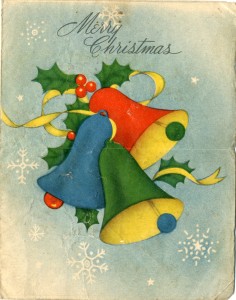
Christmas card from the Marvin Fruth collection.
A wise man once crooned that this is the most wonderful time of the year. As the winter holidays roll in, cheer seems to surround us. Coffee shops break out their festive red cups , the radio croons out classic holiday songs and the city is suddenly frosted in tiny, little light bulbs. It’s everywhere. But what are the holidays like for our troops, especially those serving overseas? For those at war? There are classic stories about the 1914 Christmas Truce, when German and British troops ventured out from their trenches into no man’s land to share season’s greetings and cigarettes, or the annual Bob Hope Christmas shows during World War II and Vietnam, but what about the stories about the individual soldier? What was it really like?
We can imagine that holidays spent in the field are wildly different from those at home. Grandparents and cousins turn into sergeants and captains, while cozy, warm homes are replaced with mess halls and tents. Those special, annual holiday meals and dishes that you look forward to every year become just a story to tell your squad about Christmas back home. Upon searching the oral history collection for holiday stories, however, it seems that most veterans have fond memories of holidays in the service. Many have stories of hosting delicious feasts on base and inviting loved ones and locals to celebrate, while others have memories of returning home from the war just in time for Christmas.
In a 2003 oral history interview, C.J. Antonie, a Madison resident and aerial navigator who served in Africa and Italy in World War II, recalled a Christmas feast while stationed in Rome. Following the bombing of the city and the American invasion in 1944, many Romans were living in a state of hunger and poverty. Antonie remembered seeing families living in the rubble of their destroyed homes and encountering elderly Italian women waiting outside the U.S. mess hall with gallon cans to collect unwanted food from the American GIs. At Christmas, Antonie described inviting the young son of the family who did his laundry to the American holiday feast:
At Christmastime they said we could bring a guest. They had a little guy about your size, and I said, “Would you like to come for Christmas dinner?” “Oh,” they said, “sure.” So I went to pick him up and they must have had him in a tub and scrubbed him with a scrub brush because he just shone. So as we went through the line I told them this guy’s got a pretty good size family at home, give him a little extra. So, he had a plate that was heaped up like this (indicating). In the meantime he’s taking bread and putting it in his pockets. And he got a bag to put all this stuff in to take it home. He ate pretty good.
(C.J. Antonie, WVM Oral History Interview, 2003)
Roger Miller, a Silver Creek native, recalled holiday memories from inside the kitchen. As a newlywed and newly appointed Army cook at Fort Bragg during the Korean War, Miller was one of only two men in basic training who was not sent to Korea. Miller was able to bring his wife Sylvia to North Carolina where he began cook school and was soon making meals for over 200 soldiers. Miller described his memories of holidays in the mess hall in a 2003 oral history interview:
“Things that stand out in my mind from that time is, the spreads that you would put on for holidays like Thanksgiving and Christmas. Just out of this world. Cans of canned nuts, and all the materials to bake cakes, and cranberry sauce, and all that. On Thanksgiving it was then, they invited your wives to come out to share a meal. It was nice.”
(Roger Mill, WVM Oral History Interview, 2003)
Although most would prefer to be with their loved ones at home for the holidays, that often is not the case for our troops in service. Today, there are roughly one million troops in active duty in over 150 countries around the world. Organizations such as the American Red Cross and Trees for Troops have created programs in which civilians can send holiday cards, packages and Christmas trees to troops overseas. We can hope that when today’s soldiers tell us their stories from their time in service, they will also have warm memories of the holidays, those of festive days in an otherwise difficult time.
Learn more about the WVM Oral History program on our Oral History page.

